Double Games People Play
By Rahimullah Yusufzai | News & Politics | Published 14 years ago
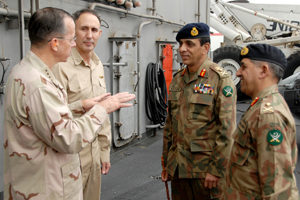 A number of recent incidents in Afghanistan have fuelled tension in the so-called Af-Pak region and contributed to the complexity of an already uncertain situation. Violence is at its peak at a time when it should have been curtailed as the NATO forces begin the phased withdrawal of their troops and transition security duties to the struggling Afghan government.
A number of recent incidents in Afghanistan have fuelled tension in the so-called Af-Pak region and contributed to the complexity of an already uncertain situation. Violence is at its peak at a time when it should have been curtailed as the NATO forces begin the phased withdrawal of their troops and transition security duties to the struggling Afghan government.
Pakistan is at the receiving end as accusing fingers are increasingly being pointed at it, both by Afghanistan and the US for its unwillingness to check the activities of Afghan Taliban militants hiding within its borders. Its denials aren’t being heard as repeated incidents of violence in Afghanistan are linked to the Taliban, particularly to the faction that has come to be known as the Haqqani Network and is led by the senior Afghan mujahideen commander Maulvi Jalaluddin Haqqani’s 32-year-old son, Sirajuddin Haqqani.
The latest accusation made by Kabul is regarding the assassination of former Afghan president and chairman of the High Council for Peace, Professor Burhanuddin Rabbani. After initially accusing elements in the Quetta Shura of the Afghan Taliban of involvement in the incident, Afghanistan’s National Directorate of Security (NDS) subsequently alleged that the plot to assassinate the 71-year-old Rabbani was hatched in Pakistan. The NDS, which is the new name for the Afghan intelligence service previously known as KHAD, later claimed that the suicide bomber, Ismatullah, who assassinated Rabbani and his bodyguards at his Kabul home in the upscale and high-security Wazir Akbar Khan locality on September 20, was a Pakistani citizen from the border town of Chaman in Balochistan. Its findings were reportedly based on the confessions of one Hameedullah Akhund an Afghan with ties to the Taliban and the alleged mastermind of the plot who had set up Ismatullah’s meeting with Rabbani after having gained the latter’s trust by promising to arrange his contacts with the Pakistan-based Quetta Shura for promoting the stalled peace process. The NDS also linked the Inter-Services Intelligence (ISI) with Rabbani’s assassination, thereby raising the stakes and risking further deterioration in the tense relations with Pakistan. The NDS has been blaming the ISI for almost every incident of violence linked to the Taliban in Afghanistan.
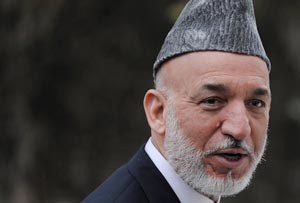 President Hamid Karzai and his government readily picked up the version of the incident elaborately put together by the NDS and directly accused Pakistan of interfering in Afghanistan’s affairs and backing the Mulla Omar-led Taliban fighting the Afghan security forces and their NATO allies. Karzai went even further and argued that there was no use holding peace talks with the Taliban as they were being controlled by Pakistan. Instead, he said his government would now focus on talking to Pakistan for restoring peace in Afghanistan.
President Hamid Karzai and his government readily picked up the version of the incident elaborately put together by the NDS and directly accused Pakistan of interfering in Afghanistan’s affairs and backing the Mulla Omar-led Taliban fighting the Afghan security forces and their NATO allies. Karzai went even further and argued that there was no use holding peace talks with the Taliban as they were being controlled by Pakistan. Instead, he said his government would now focus on talking to Pakistan for restoring peace in Afghanistan.
It was a strange reversal of roles as the Taliban, until now, had argued that they won’t hold peace talks with Karzai as he was a puppet of the US and powerless to take decisions. The Taliban appeared ready to talk to the US as they felt it held the key to ending the Afghan conflict. It was now Karzai’s turn to make a similar accusation by portraying the Taliban as proxies of Pakistan. By contending that Pakistan held the key to resolving the Afghan issue, he put Islamabad in the same position in which the Taliban had earlier placed Washington.
Karzai was signalling a major policy shift as, until now he had been a firm advocate of negotiating peace with the Taliban. He had pursued this elusive goal despite strong objections from the Afghan opposition, in particular the non-Pashtun group led by former foreign minister Dr Abdullah, who lost the 2008 presidential election to Karzai. Another stalwart of the opposition is the former intelligence chief Amrullah Saleh, who joined forces with Dr Abdullah after being sacked by Karzai from his job last year. In fact, the opposition pushed Karzai into adopting a tougher line as it blamed Pakistan for Afghanistan’s troubles and opposed talks with the Taliban until they shunned violence. To make life difficult for Karzai, the Dr Abdullah-led opposition rejected the Afghan government probe into Rabbani’s assassination and instead called for a UN inquiry.
Karzai had earlier convened a high-level meeting of former mujahideen leaders, leading politicians and top government officials to discuss the situation arising out of Rabbani’s assassination. The participants of the meeting were said to have recommended that talking to the Taliban leaders was useless as Pakistan wouldn’t let them independently enter into any peace talks. As if on cue, Afghanistan’s Wolesi Jirga, or the National Assembly, and the Senate, known as the Mesharano Jirga adopted a similar stand. The government-appointed Ulema Shura, or council of religious scholars, led by a former Taliban figure Mulla Qalamuddin, known for strictly implementing the harsh Taliban code of conduct during their rule, who advocated that the Afghan government should take steps to protect Afghanistan’s sovereignty against outside meddling in its affairs. A severe anti-Pakistan campaign was launched in the Afghan media and protests were staged in Kabul and certain other cities, mostly in northern Afghanistan, against Pakistan. Though not entirely innocent, Pakistan was the perfect scapegoat for the many failures of the Afghan government, discredited due to frequent charges of corruption and incompetence, and the over-rated US-led foreign forces.
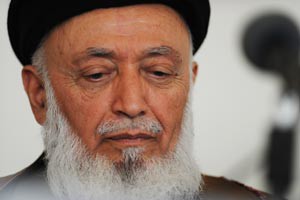 Rabbani’s assassination added fuel to the fire and poisoned Kabul’s relations with Islamabad as prior to that the US was firing on all cylinders while accusing Pakistan of backing the Haqqani Network and using it to stage some of the recent attacks in and near Kabul. The Pakistan-bashing was led by the outgoing US chairman of the joint chiefs of staff, Admiral Mike Mullen, who listed some of these attacks, including the one in June targeting the hill-top Intercontinental Hotel in Kabul and the September 13 assault by six Taliban suicide bombers, who occupied a 14-storey under-construction building in the Afghan capital for 20 long hours firing with RPG-7 rockets and light arms at the nearby US embassy, the NATO headquarters and the NDS offices. He also blamed the Haqqani Network for the suicide blast at the NATO base in Syedabad district of Wardak province, known as the western gateway to Kabul, in which 77 American soldiers were wounded.
Rabbani’s assassination added fuel to the fire and poisoned Kabul’s relations with Islamabad as prior to that the US was firing on all cylinders while accusing Pakistan of backing the Haqqani Network and using it to stage some of the recent attacks in and near Kabul. The Pakistan-bashing was led by the outgoing US chairman of the joint chiefs of staff, Admiral Mike Mullen, who listed some of these attacks, including the one in June targeting the hill-top Intercontinental Hotel in Kabul and the September 13 assault by six Taliban suicide bombers, who occupied a 14-storey under-construction building in the Afghan capital for 20 long hours firing with RPG-7 rockets and light arms at the nearby US embassy, the NATO headquarters and the NDS offices. He also blamed the Haqqani Network for the suicide blast at the NATO base in Syedabad district of Wardak province, known as the western gateway to Kabul, in which 77 American soldiers were wounded.
Though Mullen made no mention of another incident as that was rather too painful to recall, it was also in Wardak that an American gunship helicopter was recently shot down by the Taliban with an anti-tank RPG-7 rocket, killing more than 30 US Special Forces members. Though the military impact of these and other daring attacks is a matter of dispute, as the Taliban had to sacrifice scores of dedicated fighters in these suicide operations, it is widely believed that the assaults unnerved the Afghan government and caused concern among the NATO military commanders who were claiming to have made gains against the Taliban as a result of aggressive operations in the south and other parts of the country. There is no doubt that the Taliban have lost a number of mid-level commanders and many fighters, but they have shown a surprising resilience by quickly managing to replace fallen comrades and producing more suicide bombers.
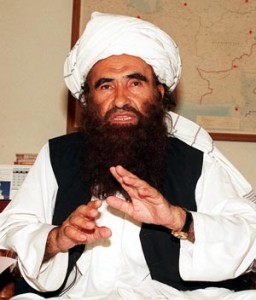 Kabul was supposed to be the most protected and well-defended city in Afghanistan due to the presence of thousands of foreign and Afghan security forces there. This was the reason it was chosen among the seven cities and provinces where the transition from NATO to the Afghan security forces was undertaken this summer. But the Taliban have brazenly struck in the most secure parts of the city in recent months much to the embarrassment of both the NATO forces that remain on standby in Kabul and the Afghan National Army and Afghan National Police.
Kabul was supposed to be the most protected and well-defended city in Afghanistan due to the presence of thousands of foreign and Afghan security forces there. This was the reason it was chosen among the seven cities and provinces where the transition from NATO to the Afghan security forces was undertaken this summer. But the Taliban have brazenly struck in the most secure parts of the city in recent months much to the embarrassment of both the NATO forces that remain on standby in Kabul and the Afghan National Army and Afghan National Police.
The Taliban assault on the US embassy in Kabul in which four American employees were wounded, and the one on the NATO headquarters where six soldiers sustained injuries understandably caused outrage. The fact that the Taliban struck in the same Wazir Akbar Khan neighbourhood twice within one week not only showed the vulnerability of supposedly tightly secured localities in Kabul, but also brought embarrassment to the US and the NATO military authorities and the Afghan government. The attacks took place when Mullen was retiring as the US military chief and his troops, despite a 10-year effort, were struggling to contain the insurgency in Afghanistan. It amounted to a personal setback to him as he had paid numerous visits to Pakistan and befriended the army chief General Ashfaq Parvez Kayani in the hope that the Pakistan military would, in due course of time, take action against the Afghan Taliban, particularly the Haqqani Network, and dismantle the remaining militants’ safe havens in the country to diminish their strength and reduce their ability to fight in Afghanistan. Mullen reacted by focusing on the ISI as the source of the trouble for the US and Afghanistan, and accusing it of backing the Haqqani Network.
This prompted other American officials to make similar accusations and trigger a war of words between the US and Pakistan government. Demands were made by certain US politicians to halt aid to Pakistan and a Senate committee recommended that assistance be tied to progress by Islamabad in taking action against the militant groups. Already uneasy and distrustful allies in the so-called war on terror, Pakistan and the US drifted further apart following these accusations. Though the White House later tried to distance the US government from Admiral Mullen’s unusually blunt remarks, it would require some effort to do damage control and revive normal relations with Pakistan, a key ally whose support is crucial in stabilising Afghanistan. A sign of improvement in the situation was the remark by an unnamed US official that the “worst was over in the US-Pakistan relations.” As officials from the two countries continued visiting and meeting each other, hopes were raised that a serious effort was underway to repair the damage in the relationship.
However, this could be a temporary mending of ties as the issue of the Haqqani Network remains unresolved and the attacks by the resurgent Taliban in Afghanistan continue to rise in numbers and intensity. By mounting suicide missions to inflict maximum damage on the US-led NATO and Afghan forces, the Taliban are trying to make the point that they can strike anywhere and anytime. In particular, the Taliban increased attacks in Lashkargah, Mehterlam, Herat and Mazar-i-Sharif, the capitals of Helmand, Laghman, Herat and Balkh provinces, respectively, where the security transition has taken place. As security in Kabul province, except its volatile Sarobi district, and in Bamiyan and Panjsher provinces, has also been handed over to the Afghan forces, the Taliban attacked targets there as well. Though they were able to launch attacks in Bamyan despite the fact that it is populated by the Shia Hazaras who hate the Taliban, no attack could be organised in Panjsher, a stronghold of the followers of the late mujahideen commander Ahmad Shah Masood.
Since the removal of the Taliban regime in December 2001 as a result of the US invasion, the situation in Afghanistan has never been as uncertain as it is now. Though the US and NATO authorities are insisting that their plans to withdraw all their forces from the country by 2014 remain unchanged despite the growing insecurity and recurrent Taliban strikes in the Afghan capital, grave doubts are being expressed about the viability of the proposal to transition security to the Afghan national army and police.
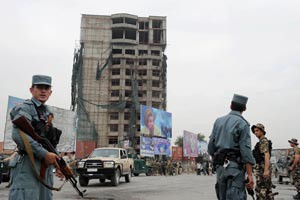 The capabilities of the Afghan security forces remain suspect as the attrition rate through desertions in the army is unusually high and the police continue to draw criticism due to indiscipline and corruption. In terms of quantity the Afghan security forces are growing in numbers in line with the timetable, but the quality of their training and performance has been termed inadequate. The biggest worry now for the US and its allies is that the Afghan security forces would not be ready to take over and defend the government in case NATO troops pulled out as scheduled in 2014. This, perhaps, is one major reason why the Afghan government and the US appear keen to conclude a strategic partnership agreement that would allow the latter to maintain military bases in Afghanistan beyond 2014.
The capabilities of the Afghan security forces remain suspect as the attrition rate through desertions in the army is unusually high and the police continue to draw criticism due to indiscipline and corruption. In terms of quantity the Afghan security forces are growing in numbers in line with the timetable, but the quality of their training and performance has been termed inadequate. The biggest worry now for the US and its allies is that the Afghan security forces would not be ready to take over and defend the government in case NATO troops pulled out as scheduled in 2014. This, perhaps, is one major reason why the Afghan government and the US appear keen to conclude a strategic partnership agreement that would allow the latter to maintain military bases in Afghanistan beyond 2014.
Rabbani’s assassination has inserted a new dangerous element into the situation as it has contributed to the rise in the anti-Pakistan sentiment in Afghanistan and damaged the fragile peace process. Islamabad has denied accusations that it was involved in the assassination of Rabbani by pointing out that he was friendly towards Pakistan and had lived there for years. It also raised questions regarding the evidence presented by the Afghan intelligence linking Pakistan with the incident and the lack of security for Rabbani. It wondered why the Afghan government wasn’t taking stock of the situation in the aftermath of the assassination of a number of Afghans friendly towards Pakistan and working for peace. In the heat of the moment though, neither side is paying much attention to the accusations and explanations, and it is doubtful Islamabad and Kabul will be able to start trusting each other any time soon.
Following Rabbani’s death, the Karzai government also hardened its position on talking to the Taliban, who in any case weren’t ready to interact with Kabul. The ethnic faultlines in Afghanistan could also become sharp as Rabbani was a Tajik and the Taliban, his alleged killers, are primarily Pashtuns. Rabbani was kind of a unifying figure for the non-Pashtuns in Afghanistan, was opposed to permanent US bases in the country and had put behind his controversial past to work for peace. The Taliban are the prime accused in his assassination; it is also possible that rogue elements among the militants or a group linked to Al Qaeda could be involved in the incident as a means to destroy the chances of peace and reconciliation in Afghanistan and sharpen the differences between Kabul and Islamabad. Anti-US elements are, in fact, suspecting CIA’s hand in the assassination.
Pakistan could hardly gain anything by getting Rabbani killed. Rather, Islamabad is being wrongly accused in his assassination, because it still has links with the Afghan Taliban. Pakistan’s military spokesman Major General Athar Abbas conceded that the ISI had contacts with the Haqqani Network by arguing that intelligence agencies maintain such links. Foreign Minister Hina Rabbani Khar even accused the CIA of maintaining links to terrorist groups as if justifying her country’s contacts with the Taliban. However, she and all other Pakistani officials have been denying the ISI’s backing for the Haqqanis. Pakistan has persistently rejected accusations that the Haqqani Network has sanctuaries in North Waziristan and the ISI chief General Shuja Pasha repeated this line during the recent All-Parties Conference, where the political parties visibly closed ranks to reject US accusations against Pakistan, oppose foreign military actions in the country, back peace efforts in Afghanistan and even give a call for initiating a peace process in Pakistan’s tribal areas. Still, not many governments around the world believe these assertions.
In fact, the US, through the anti-Pakistan tirade by its top officials managed to focus attention on Pakistan’s unhelpful role in Afghanistan by linking the ISI to the Haqqani Network. This also helped the US to take attention away from the failings of its own military and that of its NATO allies and the Afghan government. Pakistan isn’t innocent in this new phase of ‘The Great Game’ in the region as all sides in the conflict are playing double games instead of sincerely cooperating with one another to tackle militants. But the US too hasn’t been forthcoming regarding its designs for the Af-Pak region and its moves to give India a greater role in Afghanistan disregarding Pakistan’s concerns. Pakistan sees the Taliban, including the Haqqani Network, as its best bet because it lacks friends in Afghanistan and isn’t ready to turn them into enemies by going all out against them. Besides, it supports a political solution of the Afghan issue through a peace process involving the Taliban unlike the US, which wants to destroy them militarily and then force them to sue for peace on Washington’s terms. There is a fundamental difference in the approach by the US and Pakistan for ending the Afghan conflict. It cannot be easily resolved and it seems the two sides would continue to pursue their divergent approaches even if they are able to temporarily put back their uneasy relationship on track again.
Rahimullah Yusufzai is a Peshawar-based senior journalist who covers events in the NWFP, FATA, Balochistan and Afghanistan. His work appears in the Pakistani and international media. He has also contributed chapters to books on the region.


